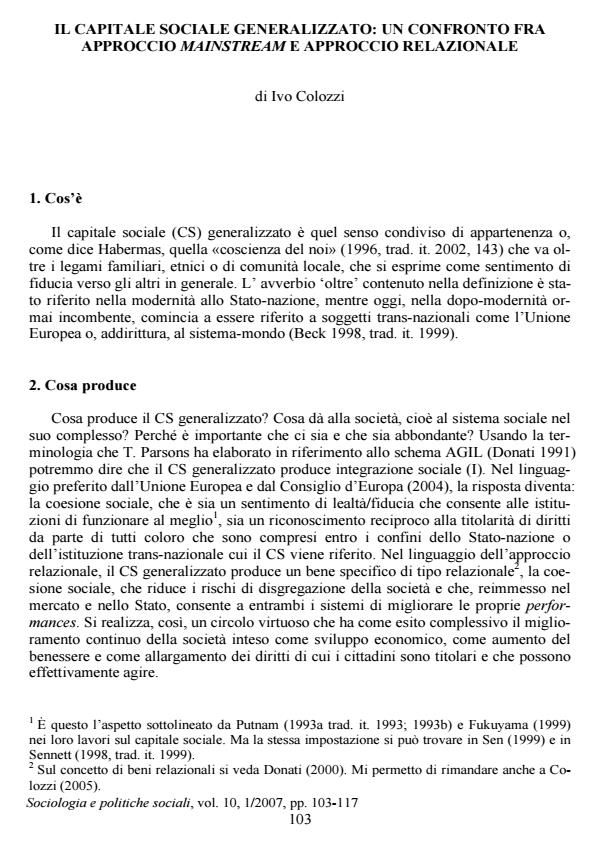Il capitale sociale generalizzato: un confronto fra approccio mainstream e approccio relazionale
Titolo Rivista SOCIOLOGIA E POLITICHE SOCIALI
Autori/Curatori Ivo Colozzi
Anno di pubblicazione 2007 Fascicolo 2007/1 Lingua Italiano
Numero pagine 15 P. 103-117 Dimensione file 83 KB
DOI
Il DOI è il codice a barre della proprietà intellettuale: per saperne di più
clicca qui
Qui sotto puoi vedere in anteprima la prima pagina di questo articolo.
Se questo articolo ti interessa, lo puoi acquistare (e scaricare in formato pdf) seguendo le facili indicazioni per acquistare il download credit. Acquista Download Credits per scaricare questo Articolo in formato PDF

FrancoAngeli è membro della Publishers International Linking Association, Inc (PILA)associazione indipendente e non profit per facilitare (attraverso i servizi tecnologici implementati da CrossRef.org) l’accesso degli studiosi ai contenuti digitali nelle pubblicazioni professionali e scientifiche
The paper defines generalized social capital as the shared feeling of belonging that is expressed as generalized trust toward the generalized other, and produces a specific relational good, namely social cohesion, which in turn reduces the risks of fragmentation within society at large. Moreover it allows both market and states to improve their own performances. According to mainstream approaches, generalized social capital is the good effect of a positive functioning of welfare systems. On the contrary, the Author’s thesis - following the results of the field surveys considered in this paper maintains that the shared values and the attitude of generalized trust are the emergent effect of a very complex relational process involving the actor, his primary groups (family and life-worlds), and the associative formations and networks. Such process can be favoured by a subsidiary intervention on the part of State and market. Relying upon the analysis of the empirical data, the Author claim that social cohesion can be produced along two distinct paths: one goes through the informal relationships and the involvement in Third sector associations; the other relies on the welfare system. These two ways don't overlap, because different people are concerned in the two cases. In the end, the paper presents some proposals to revise the approaches of social policy that are currently figuring as prominent in Europe.;
Ivo Colozzi, Il capitale sociale generalizzato: un confronto fra approccio mainstream e approccio relazionale in "SOCIOLOGIA E POLITICHE SOCIALI" 1/2007, pp 103-117, DOI: